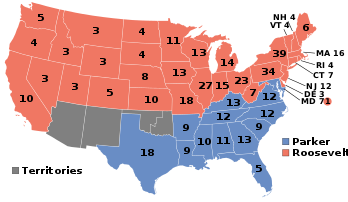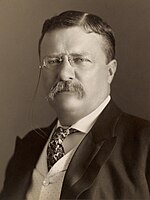| |||||||||||||||||||||||||||||
476 members of the Electoral College 239 electoral votes needed to win | |||||||||||||||||||||||||||||
|---|---|---|---|---|---|---|---|---|---|---|---|---|---|---|---|---|---|---|---|---|---|---|---|---|---|---|---|---|---|
| Turnout | 65.5%[1] | ||||||||||||||||||||||||||||
| |||||||||||||||||||||||||||||
 Presidential election results map. Red denotes states won by Roosevelt/Fairbanks, blue denotes those won by Parker/Davis. Numbers indicate the number of electoral votes allotted to each state. | |||||||||||||||||||||||||||||
| |||||||||||||||||||||||||||||
The 1904 United States presidential election was the 30th quadrennial presidential election, held on Tuesday, November 8, 1904. Incumbent Republican President Theodore Roosevelt defeated the conservative Democratic nominee, Alton B. Parker. Roosevelt's victory made him the first president who ascended to the presidency upon the death of his predecessor to win a full term in his own right. This was also the second presidential election in which both major party candidates were registered in the same home state; the others have been in 1860, 1920, 1940, 1944, and 2016.
Roosevelt took office in September 1901 following the assassination of his predecessor, William McKinley. After the February 1904 death of McKinley's ally, Senator Mark Hanna, Roosevelt faced little opposition at the 1904 Republican National Convention. The conservative Bourbon Democrat allies of former President Grover Cleveland temporarily regained control of the Democratic Party from the followers of William Jennings Bryan, and the 1904 Democratic National Convention nominated Alton B. Parker, Chief Judge of the New York Court of Appeals. Parker triumphed on the first ballot of the convention, defeating newspaper magnate William Randolph Hearst.
As there was little difference between the candidates' positions, the race was largely based on their personalities; the Democrats argued that the Roosevelt presidency was "arbitrary" and "erratic".[2] Republicans emphasized Roosevelt's success in foreign affairs and his record of firmness against monopolies. Roosevelt easily defeated Parker, sweeping every US region except the South, while Parker lost multiple states won by Bryan in 1900, as well as his home state of New York. Roosevelt's popular vote margin of 18.8% was the largest since James Monroe's victory in the 1820 presidential election, and would be the biggest popular vote victory in the century between 1820 and Warren Harding's 1920 landslide. With Roosevelt's landslide, he became the first presidential candidate to receive over 300 electoral votes in a presidential election. This was the first time since 1868 that Missouri voted for the Republican candidate.
- ^ "National General Election VEP Turnout Rates, 1789-Present". United States Election Project. CQ Press.
- ^ "Theodore Roosevelt: Campaigns and Elections—Miller Center". Millercenter.org. Archived from the original on October 6, 2012. Retrieved August 18, 2016.

